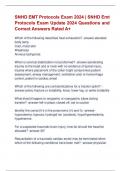SNHD EMT Protocols Exam 2024 | SNHD Emt
Protocols Exam Update 2024 Questions and
Correct Answers Rated A+
Which of the following describes heat exhaustion? -answer-elevated
body temp
Cool, moist skin
Weakness
Anxious tachypnea
When is cervical stabilization not preformed? -answer-penetrating
trauma to the head and or neck with no evidence of spinal injury,
injuries where placement of the collar might compromise patient
assessment, airway management, ventilation and/ or hemorrhage
control, patient in cardiac arrest
Which of the following are contraindications for a traction splint? -
answer-pelvic fracture or instability, knee, lower leg, or ankle instability
What should happen to orogastric or nasogastric tubes during
transfer? -answer-left in place, closed off, set to suction
Identify the correct h's in the pneumonic h's and t's -answer-
hypovolemia, hypoxia, hydrogel ion (acidosis), hypo/hyperkalemia,
hypothermia
For a suspected traumatic brain injury, how far should the head be
elevated? -answer-30''
Resuscitation of a traumatic cardiac arrest may be terminated when
which of the following conditions have been met? -answer-physician
,approves termination of resuscitation, airway opened with basic life
support measures, provide effective ventilation with 100% oxygen for
2 minutes, preform bilateral needle throacentesis if tension
pneumothorax suspected.
The administration of nitroglycerin is contraindicated for any patient
who has used erectile dysfunction medications within the last 24 hours
-answer-false
What applies for a mild allergic reaction -answer-skin rashes, itchy
sensations, hives, no respiratory involvement
What type of patients should ambulance attendants transfer? -answer-
only those whose therapy required during transfer lies within the
ambulance attendants capabilities.
When can telephone contact to a receiving facility be used? -answer-
when it is routed via a recorded phone patch through the fire alarm
office
For a patient to be transported to an approved alcohol and drug abuse
facility, the diastolic blood pressure must be between what range? -
answer-60-100
The sunrise hospital catmint area is for all adult trauma calls and
pediatric step 3 trauma calls that meet the trauma field triage criteria
protocol and occur within the geographical area border by paradise
road to the west, sahara avenue to the north, sunset road to the south,
and the country line to the east, are to be transported to sunrise
hospital and medical center and the medical directions for the
treatment of the patient must originate at the centre -answer-true
,What is the treatment plan for heat cramps? -answer-po fluids as
tolerated, monitor and reassess, continue general patient care
A patient with a systolic blood pressure between what ranges may br
places in an er waiting room? -answer-100-180
Which are approved stroke centers? -answer-centennial hills hospital,
desert spings, mountain view, southern hills, spring valley. St. Rose
martin. St rose siena, summerlin, valley. Sunrise, umc
Orthopedic devices cannot be left in place during interfacility transfer -
answer-false
A dnr and polst order shall be validated by confirming the patient's: -
answer-name, age, condition of identification form
When are backboards indicated? -answer-extrication/patient
movement
Postpartum eclampsia/pre-eclampsia commonly presents how long
after childbirth? -answer-up to 48 hours
For all other patients, telemetry reports shall include, at a minimum -
answer-attendant/vehicle identification, nature or call: info only or
request for orders, patient info, patient condition, history including
chief compliant, pertinent associated symptoms, time since onset,
past history, objective findings including general status of patient, level
of responsiveness, vitals, localized findings, impression of patients
problem, treatments in progress or requests for drugs or procedures,
eta
, What are symptoms of severe allergic reaction -answer-skin disorders,
respiratory difficulty, hypotension
Which of the following describes heat stroke? -answer-hot, dry skin,
high body temp > 104, hypotension, ams/coma
Cervical stabilization is the placement of an approved, properly-sized
cervical collar and securing the patient to a long spinal board -answer-
false
Patients are not to be transported on backboards (unless movement
off the backboard would delay immediate transport of patients with
life-treatening injuries or cure spinal injuries) -answer-true
How much does the head represent in an adult patient in the rule of
9's -answer-9%
For patients who meet trauma field triage criteria, telemetry reports
shall include: -answer-patient age, gender, mechanism of injury,
ambulatory at scene, suspected injuries, vital signs, airway status,
neurological status, eta, incident identifier if multiple patients are
involved.
During spinal immobilization, tape, head straps, wedges, and head
and/or neck support devices are not recommended -answer-true
Radio contact should be established for what patients? -answer-all
trauma center patients, code 3 returns, need for telemetry physician,
as indicated per protocol
Which of the following describes heat cramps? -answer-normal to
elevated body temp, weakness, muscle cramping




